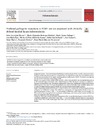Identificador persistente para citar o vincular este elemento:
https://accedacris.ulpgc.es/jspui/handle/10553/58401
| Título: | Predicted pathogenic mutations in STAP1 are not associated with clinically defined familial hypercholesterolemia | Autores/as: | Lamiquiz-Moneo, Itziar Restrepo-Córdoba, María Alejandra Mateo-Gallego, Rocío Bea, Ana María Alberiche Ruano, Maria Del Pino García-Pavía, Pablo Cenarro, Ana Martín, Cesar Civeira, Fernando Sánchez-Hernández, Rosa María |
Clasificación UNESCO: | 320502 Endocrinología | Palabras clave: | Familial hypercholesterolemia STAP1 Mutation-negative familial hypercholesterolemia Family cosegregation |
Fecha de publicación: | 2020 | Publicación seriada: | Atherosclerosis | Resumen: | Background and aims: Autosomal dominant familial hypercholesterolemia (FH) is caused by mutations in LDLR, APOB and PCSK9. Two new putative loci causing FH have been identified recently, the p.(Leu167del) mutation in APOE and new mutations in the signal transducing adaptor family member STAP1. We aimed at investigating the role of STAP1 mutations in the etiology of FH. Methods: We sequenced LDLR, APOB, PCSK9, LDLRAP1, APOE, LIPA and STAP1 with the LipidInCode platform in 400 unrelated subjects from Spain with a clinical diagnosis of FH. All subjects carrying rare predicted pathogenic variants in STAP1 gene, described as pathogenic by at least three bioinformatic analysis and having an allelic frequency lower than 1% in general population, were selected for family study. Available relatives were recruited, including both hypercholesterolemic and non-hypercholesterolemic family members. Results: Sequencing analysis of STAP1 gene revealed seventeen rare variants, four of them being described as pathogenic by bioinformatic analysis. We studied the cosegregation with hypercholesterolemia of four rare predicted pathogenic variants, c.-60A > G, p.(Arg12His), p.(Glu97Asp), p.(Pro176Ser) in seven families. We did not observe any cosegregation between genotype and phenotype, even carriers of rare variants in STAP1 had lower LDL cholesterol levels than non-carriers. Conclusions: This study analyzes the family cosegregation of four rare predicted pathogenic variants of STAP1, p.(Arg12His), p.(Glu97Asp), p.(Pro176Ser) and c.-60A > G, in seven families, showing absence of cosegregation in all of them. These results would suggest that STAP1 gene is not involved in hypercholesterolemia of these families. | URI: | https://accedacris.ulpgc.es/handle/10553/58401 | ISSN: | 0021-9150 | DOI: | 10.1016/j.atherosclerosis.2019.11.025 | Fuente: | Atherosclerosis [ISSN 0021-9150], v. 292, p. 143-151 |
| Colección: | Artículos |
Citas SCOPUSTM
21
actualizado el 08-jun-2025
Citas de WEB OF SCIENCETM
Citations
18
actualizado el 08-feb-2026
Visitas
251
actualizado el 16-ene-2026
Descargas
474
actualizado el 16-ene-2026
Google ScholarTM
Verifica
Altmetric
Comparte
Exporta metadatos
Los elementos en ULPGC accedaCRIS están protegidos por derechos de autor con todos los derechos reservados, a menos que se indique lo contrario.
